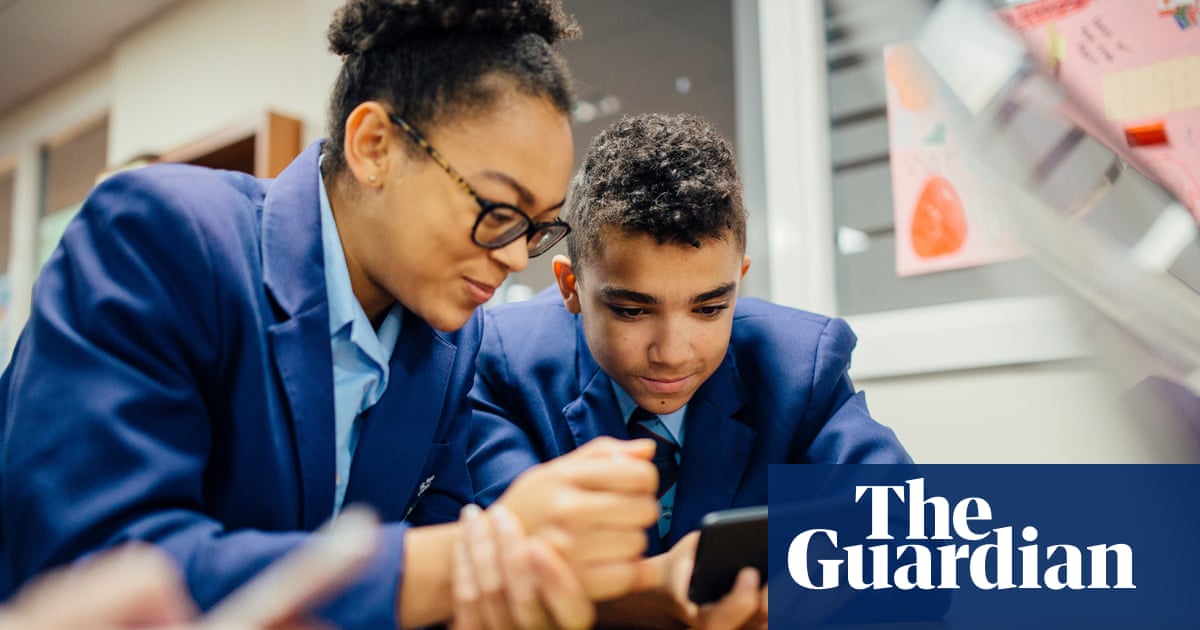Photo credit: www.theguardian.com
The Complex Landscape of Teen Smartphone Usage and Regulation
A prominent academic assigned by the UK government to evaluate the impact of smartphones on adolescents has expressed skepticism regarding the effectiveness of total bans, labeling them as “unrealistic and potentially harmful.” Amy Orben, a researcher at the University of Cambridge, is leading this significant study on young people’s smartphone usage, alongside a team of academics from various UK institutions, commissioned by the Department for Science, Innovation and Technology (DSIT).
Currently, government officials are cautious about enforcing any new legal restrictions concerning children and social media that extend beyond the existing Online Safety Act, which primarily targets harmful content online. Several Members of Parliament are advocating for more comprehensive measures, such as limiting social media access for those under 16, enforcing outright bans on smartphones in educational settings, or regulating social media algorithms responsible for promoting addictive content among teenagers.
In a recent publication in the British Medical Journal (BMJ), Orben and her co-authors asserted that outright bans and restrictions are unlikely to yield significant results. Instead, they recommended creating phone-free zones for children and teenagers. The authors highlighted the differences between public health interventions like smoking bans and restrictions on technology use, noting that the negative consequences of smoking are unequivocally established, while the overall impact of smartphones and social media on youth is more ambiguous.
“Prohibiting all tech use to guard against potential risks is impractical and might even be harmful in today’s society, where technology is not only ubiquitous but also provides significant benefits, including access to information and social interaction,” the paper emphasized.
The authors acknowledged the rising public concern over the potential adverse effects of smartphones and social media on various aspects of young people’s lives, including health, academic success, behavior issues, and bullying. Nevertheless, they stressed that there are “no straightforward, universally applicable solutions.” Many parents and policymakers are inclined to believe in the inherent dangers of smartphones and social media, but the authors argue that existing evidence offers a more nuanced understanding of their effects on children.
Imposing device bans could infringe upon children’s rights to access technology, which is instrumental for their education and future success, the researchers cautioned. They recognized that, while some vulnerable kids may face substantial risks from specific digital content, restrictions could also adversely affect other high-risk groups.
The researchers did express concerns about marketing strategies aimed at younger audiences, which often lead to excessive use and do not foster healthy technology habits. This adds another layer of complexity to the ongoing discussions about regulating digital content and social media practices.
Peter Kyle, the Secretary of State for Science and Technology, appointed Orben to spearhead this research initiative in January 2024. Notably, while her work has been cited by various stakeholders, including proponents and opponents of technology bans, Orben clarified that her aim is not to advocate for particular policy outcomes. This is underscored by her mention of the Australian government’s recent decision to restrict social media access for users under 16.
In her statements, Orben noted, “Understanding the impact of the digital landscape on youth is intricate, and there aren’t straightforward answers. The goal of my team’s report is to recommend further research avenues to cultivate high-quality evidence rather than to yield specific policy recommendations.” She urged for a balanced approach that encompasses not just technology-free environments, but also promotes digital literacy and enhances platform safety as essential components of online safety.
In light of recent events, including the Netflix drama “Adolescence,” which explores dark themes related to online content’s influence on youth, there has been mounting pressure on officials to rethink smartphone regulations for minors. Labour MP Josh MacAlister recently retreated from a proposed private member’s bill concerning social media algorithms aimed at teenagers due to ministerial resistance.
The Education Secretary, Bridget Phillipson, is currently reviewing existing guidelines regarding smartphone use in schools and is assessing the effectiveness of these regulations based on a small sample of institutions.
Prime Minister Keir Starmer recently held discussions with campaigners and the creators of “Adolescence” at Number 10, suggesting that the subject of smartphone use among young people should be addressed comprehensively within educational systems. He acknowledged that there is no singular solution to mitigate potential harms related to smartphone usage among adolescents.
The DSIT has been approached for further comment on these developments.
Source
www.theguardian.com

